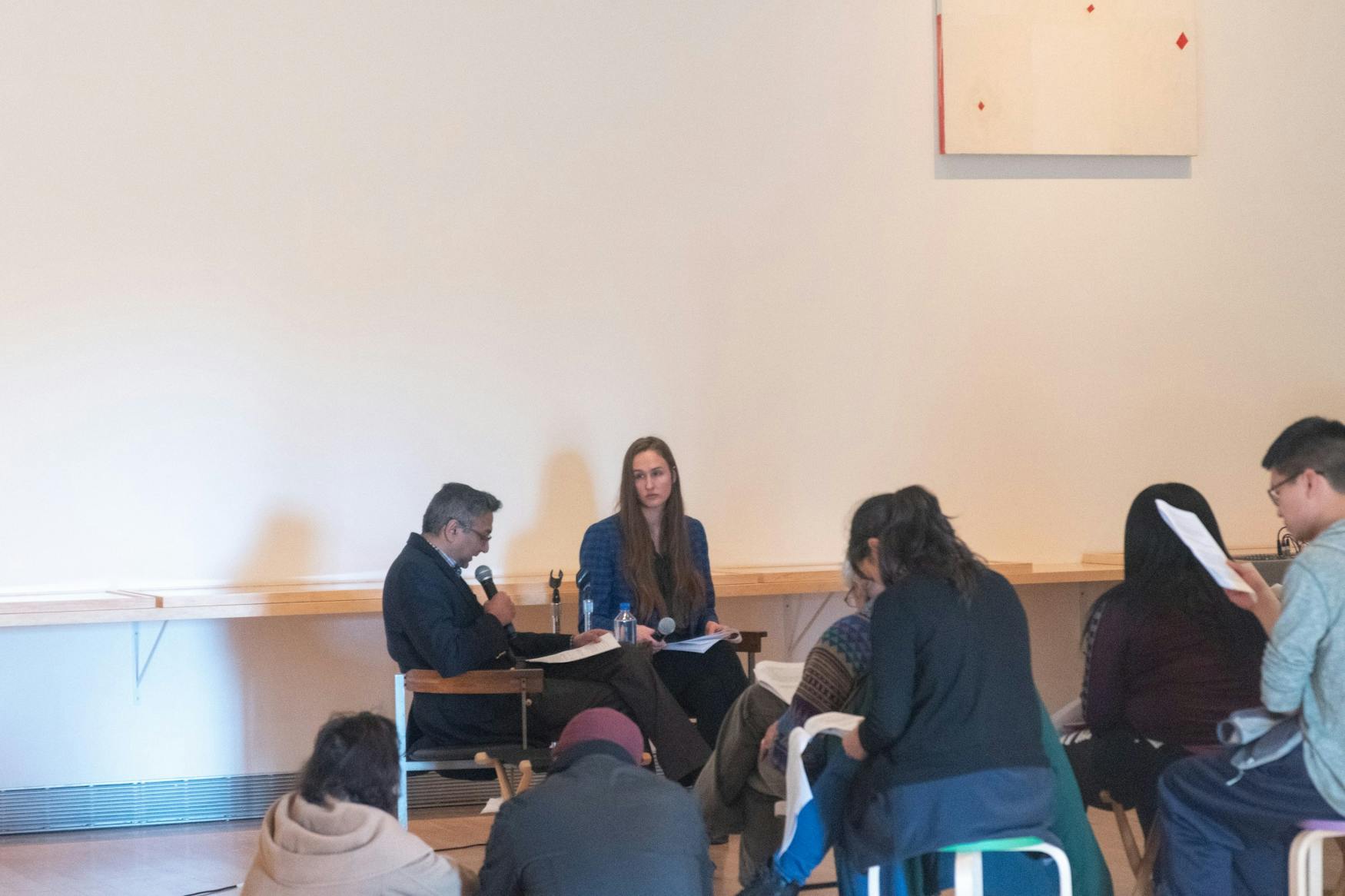Letters reveal tensions between love and politics
The event examined the love story and letters between a Nazi philosopher and a German Jewish political theorist.
Profs. Samantha Rose Hill, assistant director of the Hannah Arendt Center for Politics and Humanities and a visiting assistant professor of Politics at Bard College, and Rajesh Sampath, associate professor of the Philosophy of Justice, Rights, and Social Change at the Heller School of Social Policy and Management, read and discussed letters between political theorist Hannah Arendt and philosopher Martin Heidegger during the event “On Reconciliation” at the Rose Art Museum. The discussion was facilitated by artist Dora García and Senior Curator-at-Large Ruth Estévez on Feb. 14.
Hill and Sampath took turns reading from the letters, facsimiles of which were on display at the museum, in a presentation that lasted approximately 30 minutes. The letters span 50 years, from the 1920s through the 1970s, and touch on the romantic and intellectual relationship between Heidegger and Arendt.
Heidegger was a groundbreaking philosopher of metaphysics and ontology, or the study of being, and a member of the Nazi party in Germany during Hitler’s reign. Arendt was a German Jew who was forced to flee Germany in 1933 when Heidegger began implementing Nazi policies at the University of Freiburg, where Arendt was his student. Arendt wrote prolifically on totalitarianism, thinking and modernity, and reported on the trial of the Nazi war criminal Adolf Eichmann.
To begin the post-reading discussion, Hill said that the relationship with Heidegger “played a very large role in the life and work” of Arendt, but that because Heidegger prioritized his work and his wife over Arendt, a “gap” always existed between them. After their romantic relationship ended, Heidegger remained a mentor to Arendt, and in later years would invite her to have meals with him and his wife and discuss each other’s work.
Sampath expressed the tension he feels in relation to Heidegger. Sampath said that he has an “obsession as a scholar and a thinker” with Heidegger, but is at the same time disgusted by what he called Heidegger’s “embodiment of evil” and the “antipathy [he] had toward the human being.”
García said that especially in the midst of the #MeToo movement, many people wonder how to deal with “despicable” men who create great work. “The big question,” García said, is whether Heidegger “was a Nazi and a good philosopher, or he was a Nazi and a Nazi philosopher as well, and what do we do with that?”
Hill said that Arendt was “radically dedicated to plurality” and understanding different ways of thinking, and thus Arendt wanted to understand how a great thinker such as Heidegger could become a Nazi. Arendt believed that his engagement with philosophy “turned him away from the world, it blinded him,” Hill said.
In one letter, Arendt said that she did not feel like a Jewish woman, and an audience member asked how Arendt could renounce her own identity. Hill explained that Arendt did not renounce her identity, and worked exclusively for Jewish organizations when she left Germany, but she was “profoundly counterposed to any form of identity politics” and did not want to assign meaning to an identity that for her was just “a fact of life.”
Similarly, Arendt saw love and politics as completely separate. Arendt believed that it is impossible to “ground a politics of solidarity on love,” Hill said. Love, Arendt believed, “turns us away from the world,” while politics should see and address the world as it is. In fact, she called love “the most powerful of all anti-political forces.”
Another audience member asked why Hill and Sampath alternated reading from Heidegger’s and Arendt’s letters rather than each sticking to one side of the correspondence. García said that it was a dramaturgical choice intended to keep listeners from associating the reader with the “character” of either Arendt or Heidegger.
The letter reading and discussion was part of Garcia’s exhibition, “Love with Obstacles,” which will be on display through May 17 in the Lois Foster Gallery.



Please note All comments are eligible for publication in The Justice.